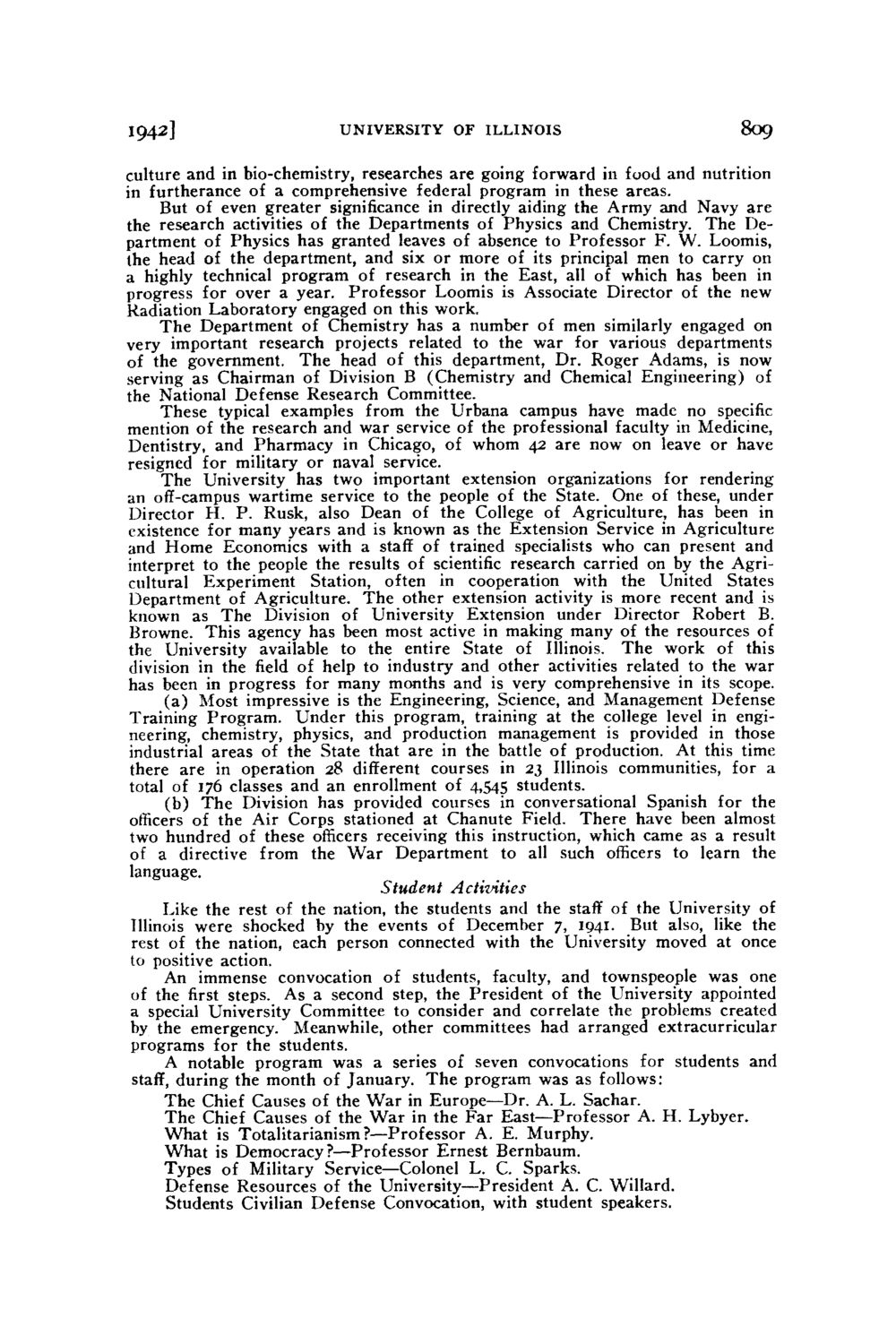| |
| |
Caption: Board of Trustees Minutes - 1942
This is a reduced-resolution page image for fast online browsing.

EXTRACTED TEXT FROM PAGE:
1942] UNIVERSITY OF ILLINOIS 809 culture and in bio-chemistry, researches are going forward in food and nutrition in furtherance of a comprehensive federal program in these areas. But of even greater significance in directly aiding the Army and Navy are the research activities of the Departments of Physics and Chemistry. The Department of Physics has granted leaves of absence to Professor F . W. Loomis, the head of the department, and six or more of its principal men to carry on a highly technical program of research in the East, all of which has been in progress for over a year. Professor Loomis is Associate Director of the new Radiation Laboratory engaged on this work. T h e Department of Chemistry has a number of men similarly engaged on very important research projects related to the war for various departments of the government. T h e head of this department, Dr. Roger Adams, is now serving as Chairman of Division B (Chemistry and Chemical Engineering) of the National Defense Research Committee. These typical examples from the Urbana campus have made no specific mention of the research and war service of the professional faculty in Medicine, Dentistry, and Pharmacy in Chicago, of whom 42 are now on leave or have resigned for military or naval service. The University has two important extension organizations for rendering an off-campus wartime service to the people of the State. One of these, under Director H . P . Rusk, also Dean of the College of Agriculture, has been in existence for many years and is known as the Extension Service in Agriculture and H o m e Economics with a staff of trained specialists who can present and interpret to the people the results of scientific research carried on by the Agricultural Experiment Station, often in cooperation with the United States Department of Agriculture. T h e other extension activity is more recent and is known as The Division of University Extension under Director Robert B. Browne. This agency has been most active in making many of the resources of the University available to the entire State of Illinois. T h e work of this division in the field of help to industry and other activities related to the war has been in progress for many months and is very comprehensive in its scope. (a) Most impressive is the Engineering, Science, and Management Defense Training P r o g r a m . Under this program, training at the college level in engineering, chemistry, physics, and production management is provided in those industrial areas of the State that are in the battle of production. At this time there are in operation 28 different courses in 23 Illinois communities, for a total of 176 classes and an enrollment of 4,545 students. (b) T h e Division has provided courses in conversational Spanish for the officers of the Air Corps stationed at Chanute Field. There have been almost two hundred of these officers receiving this instruction, which came as a result of a directive from the W a r Department to all such officers to learn the language. Student Activities Like the rest of the nation, the students and the staff of the University of Illinois were shocked by the events of December 7, 1941. But also, like the rest of the nation, each person connected with the University moved at once to positive action. An immense convocation of students, faculty, and townspeople was one of the first steps. As a second step, the President of the University appointed a special University Committee to consider and correlate the problems created by the emergency. Meanwhile, other committees had arranged extracurricular programs for the students. A notable program was a series of seven convocations for students and staff, during the month of January. T h e program was as follows: T h e Chief Causes of the W a r in Europe—Dr. A. L. Sachar. The Chief Causes of the W a r in the F a r East—Professor A. H . Lybyer. W h a t is Totalitarianism?—Professor A. E. Murphy. W h a t is Democracy?—Professor Ernest Bernbaum. Types of Military Service—Colonel L. C. Sparks. Defense Resources of the University—President A. C. Willard. Students Civilian Defense Convocation, with student speakers.
| |